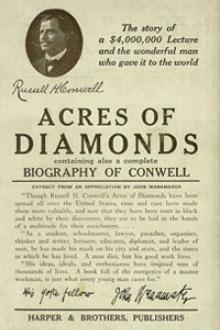Acres of Diamonds by Russell H. Conwell (read after .TXT) 📖

- Author: Russell H. Conwell
- Performer: 1599869802
Book online «Acres of Diamonds by Russell H. Conwell (read after .TXT) 📖». Author Russell H. Conwell
But it serves simply to illustrate my thought, which I emphasize by saying if you do not have the actual diamond-mines literally you have all that they would be good for to you. Because now that the Queen of England has given the greatest compliment ever conferred upon American woman for her attire because she did not appear with any jewels at all at the late reception in England, it has almost done away with the use of diamonds anyhow. All you would care for would be the few you would wear if you wish to be modest, and the rest you would sell for money.
Now then, I say again that the opportunity to get rich, to attain unto great wealth, is here in Philadelphia now, within the reach of almost every man and woman who hears me speak to-night, and I mean just what I say. I have not come to this platform even under these circumstances to recite something to you. I have come to tell you what in God’s sight I believe to be the truth, and if the years of life have been of any value to me in the attainment of common sense, I know I am right; that the men and women sitting here, who found it difficult perhaps to buy a ticket to this lecture or gathering to-night, have within their reach “acres of diamonds,” opportunities to get largely wealthy. There never was a place on earth more adapted than the city of Philadelphia to-day, and never in the history of the world did a poor man without capital have such an opportunity to get rich quickly and honestly as he has now in our city. I say it is the truth, and I want you to accept it as such; for if you think I have come to simply recite something, then I would better not be here. I have no time to waste in any such talk, but to say the things I believe, and unless some of you get richer for what I am saying to-night my time is wasted.
I say that you ought to get rich, and it is your duty to get rich. How many of my pious brethren say to me, “Do you, a Christian minister, spend your time going up and down the country advising young people to get rich, to get money?” “Yes, of course I do.” They say, “Isn’t that awful!
Why don’t you preach the gospel instead of preaching about man’s making money?” “Because to make money honestly is to preach the gospel.” That is the reason. The men who get rich may be the most honest men you find in the community.
“Oh,” but says some young man here to-night, “I have been told all my life that if a person has money he is very dishonest and dishonorable and mean and contemptible. “My friend, that is the reason why you have none, because you have that idea of people. The foundation of your faith is altogether false. Let me say here clearly, and say it briefly, though subject to discussion which I have not time for here, ninety-eight out of one hundred of the rich men of America are honest.
That is why they are rich. That is why they are trusted with money. That is why they carry on great enterprises and find plenty of people to work with them. It is because they are honest men.
Says another young man, “I hear sometimes of men that get millions of dollars dishonestly.”
Yes, of course you do, and so do I. But they are so rare a thing in fact that the newspapers talk about them all the time as a matter of news until you get the idea that all the other rich men got rich dishonestly.
My friend, you take and drive me—if you furnish the auto—out into the suburbs of Philadelphia, and introduce me to the people who own their homes around this great city, those beautiful homes with gardens and flowers, those magnificent homes so lovely in their art, and I will introduce you to the very best people in character as well as in enterprise in our city, and you know I will.
A man is not really a true man until he owns his own home, and they that own their homes are made more honorable and honest and pure, and true and economical and careful, by owning the home.
For a man to have money, even in large sums, is not an inconsistent thing. We preach against covetousness, and you know we do, in the pulpit, and oftentimes preach against it so long and use the terms about “filthy lucre” so extremely that Christians get the idea that when we stand in the pulpit we believe it is wicked for any man to have money—until the collection-basket goes around, and then we almost swear at the people because they don’t give more money. Oh, the inconsistency of such doctrines as that!
Money is power, and you ought to be reasonably ambitious to have it. You ought because you can do more good with it than you could without it. Money printed your Bible, money builds your churches, money sends your missionaries, and money pays your preachers, and you would not have many of them, either, if you did not pay them. I am always willing that my church should raise my salary, because the church that pays the largest salary always raises it the easiest. You never knew an exception to it in your life. The man who gets the largest salary can do the most good with the power that is furnished to him.
Of course he can if his spirit be right to use it for what it is given to him.
I say, then, you ought to have money. If you can honestly attain unto riches in Philadelphia, it is your Christian and godly duty to do so.
It is an awful mistake of these pious people to think you must be awfully poor in order to be pious.
Some men say, “Don’t you sympathize with the poor people?” Of course I do, or else I would not have been lecturing these years. I won’t give in but what I sympathize with the poor, but the number of poor who are to be sympathized with is very small. To sympathize with a man whom God has punished for his sins, thus to help him when God would still continue a just punishment, is to do wrong, no doubt about it, and we do that more than we help those who are deserving. While we should sympathize with God’s poor—that is, those who cannot help themselves—
let us remember there is not a poor person in the United States who was not made poor by his own shortcomings, or by the shortcomings of some one else. It is all wrong to be poor, anyhow. Let us give in to that argument and pass that to one side.
A gentleman gets up back there, and says, “Don’t you think there are some things in this world that are better than money?” Of course I do, but I am talking about money now. Of course there are some things higher than money. Oh yes, I know by the grave that has left me standing alone that there are some things in this world that are higher and sweeter and purer than money. Well do I know there are some things higher and grander than gold. Love is the grandest thing on God’s earth, but fortunate the lover who has plenty of money. Money is power, money is force, money will do good as well as harm. In the hands of good men and women it could accomplish, and it has accomplished, good.
I hate to leave that behind me. I heard a man get up in a prayer-meeting in our city and thank the Lord he was “one of God’s poor.”
Well, I wonder what his wife thinks about that?
She earns all the money that comes into that house, and he smokes a part of that on the veranda.
I don’t want to see any more of the Lord’s poor of that kind, and I don’t believe the Lord does.
And yet there are some people who think in order to be pious you must be awfully poor and awfully dirty. That does not follow at all. While we sympathize with the poor, let us not teach a doctrine like that.
Yet the age is prejudiced against advising a Christian man (or, as a Jew would say, a godly man) from attaining unto wealth. The prejudice is so universal and the years are far enough back, I think, for me to safely mention that years ago up at Temple University there was a young man in our theological school who thought he was the only pious student in that department. He came into my office one evening and sat down by my desk, and said to me: “Mr. President, I think it is my duty sir, to come in and labor with you.”
“What has happened now?” Said he, “I heard you say at the Academy, at the Peirce School commencement, that you thought it was an honorable ambition for a young man to desire to have wealth, and that you thought it made him temperate, made him anxious to have a good name, and made him industrious. You spoke about man’s ambition to have money helping to make him a good man. Sir, I have come to tell you the Holy Bible says that `money is the root of all evil.’ ”
I told him I had never seen it in the Bible, and advised him to go out into the chapel and get the Bible, and show me the place. So out he went for the Bible, and soon he stalked into my office with the Bible open, with all the bigoted pride of the narrow sectarian, or of one who founds his Christianity on some misinterpretation of Scripture.
He flung the Bible down on my desk, and fairly squealed into my ear: “There it is, Mr.
President; you can read it for yourself.” I said to him: “Well, young man, you will learn when you get a little older that you cannot trust another denomination to read the Bible for you. You belong to another denomination. You are taught in the theological school, however, that emphasis is exegesis. Now, will you take that Bible and read it yourself, and give the proper emphasis to it?”
He took the Bible, and proudly read, “ `The love of money is the root of all evil.’ ”
Then he had it right, and when one does quote aright from that same old Book he quotes the





Comments (0)